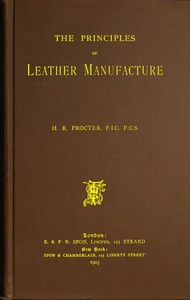The Principles of Leather Manufacture by H. R. Procter
"The Principles of Leather Manufacture" by H. R. Procter is a scientific publication written in the early 20th century. The book explores the intricacies of the leather manufacturing process, emphasizing both the historical methods and the modern scientific principles that underpin this age-old craft. It aims to bridge the gap between practical tanning techniques and theoretical chemistry, targeting both chemists and professionals in the leather trade. The beginning of the work introduces
the origins of leather manufacture, tracing back to prehistoric times when humans utilized animal skins for clothing. Procter outlines how early techniques evolved from primitive methods of rubbing animal fats onto skins to the more refined processes we see today, including tanning with vegetable materials and methods involving salts and alum. He hints at the significant advancements made in the industry, mentioning historical references from texts like the "Iliad," and foreshadows a detailed discussion on the chemistry involved in converting animal hides into durable leather, setting the stage for a comprehensive exploration of tanning methods. (This is an automatically generated summary.)
Read or download for free
| How to read | Url | Size | |||
|---|---|---|---|---|---|
| Read now! | https://www.gutenberg.org/ebooks/57548.html.images | 1.4 MB | |||
| EPUB3 (E-readers incl. Send-to-Kindle) | https://www.gutenberg.org/ebooks/57548.epub3.images | 7.3 MB | |||
| EPUB (older E-readers) | https://www.gutenberg.org/ebooks/57548.epub.images | 7.3 MB | |||
| EPUB (no images, older E-readers) | https://www.gutenberg.org/ebooks/57548.epub.noimages | 534 kB | |||
| Kindle | https://www.gutenberg.org/ebooks/57548.kf8.images | 8.5 MB | |||
| older Kindles | https://www.gutenberg.org/ebooks/57548.kindle.images | 8.3 MB | |||
| Plain Text UTF-8 | https://www.gutenberg.org/ebooks/57548.txt.utf-8 | 1.1 MB | |||
| Download HTML (zip) | https://www.gutenberg.org/cache/epub/57548/pg57548-h.zip | 6.8 MB | |||
| There may be more files related to this item. | |||||
Similar Books
About this eBook
| Author | Procter, H. R. (Henry Richardson), 1848-1927 |
|---|---|
| LoC No. | 03015091 |
| Title | The Principles of Leather Manufacture |
| Contents | Introductory and historical -- Introductory sketch of leather manufacture -- The living cell -- Putrefaction and fermentation -- Antiseptics and disinfectants -- The origin and curing of hides and skins -- Structure and growth of skin -- The chemical constituents of skin -- The physical chemistry of the hide-fibre -- Water as used in the tannery -- Soaking and softening of hides and skins -- Depilation -- Deliming, bating, puering and drenching -- Alum tannage, or tawing -- Iron and chrome tannages -- Principles of the vegetable tanning processes -- Combination of vegetable and mineral tannages -- Vegetable tanning materials -- The chemistry of the tannins -- The sampling and analysis of tanning materials -- The grinding of tanning materials -- The extraction of tanning materials, and the making of extracts -- Fats, soaps, oils and waxes -- Oil tannages, and the use of oils and fats in currying -- Dyes and dyeing -- Evaporation, heating and drying -- Construction and maintenance of tanneries -- Waste products and their disposal -- Appendix A: Method of the international association of leather-trades chemists for the analysis of tanning materials. Corrected to 1901 -- Appendix B: The decimal system -- Appendix C: Method of analysis of tanning materials of the american association of official agricultural chemists. Corrected to 1901 -- Appendix D: Lists of coal-tar dyes suitable for dyeing and staining leather, furnished by Mr. M. C. Lamb. |
| Credits |
Produced by Chris Curnow, Harry Lamé and the Online Distributed Proofreading Team at http://www.pgdp.net (This file was produced from images generously made available by The Internet Archive) |
| Reading Level | Reading ease score: 55.8 (10th to 12th grade). Somewhat difficult to read. |
| Language | English |
| LoC Class | TS: Technology: Manufactures |
| Subject | Leather |
| Category | Text |
| EBook-No. | 57548 |
| Release Date | Jul 20, 2018 |
| Copyright Status | Public domain in the USA. |
| Downloads | 489 downloads in the last 30 days. |
| Project Gutenberg eBooks are always free! | |

